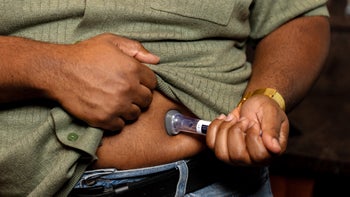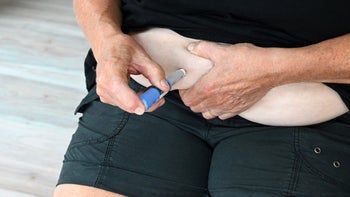
Mounjaro and Diarrhea: How to Manage This Common Side Effect
Key takeaways:
Mounjaro (tirzepatide) is an injectable medication that’s FDA-approved to treat Type 2 diabetes. It can cause stomach-related side effects, including diarrhea.
You’re more likely to develop diarrhea when you first start taking Mounjaro or when your dose increases.
Diarrhea from Mounjaro usually gets better once you reach your goal dose. Most people don’t need treatment for Mounjaro-related diarrhea.

Non-insulin injectable medications that help to improve blood sugar levels have been growing in popularity. Mounjaro (Tirzepatide) is one of these medications. It’s FDA-approved to treat Type 2 diabetes.
Mounjaro is a glucagon-like peptide-1 (GLP-1) and glucose-dependent insulinotropic polypeptide (GIP) receptor agonist. Its unique mechanism of action makes it the only medication in its class.
Mounjaro can help deliver powerful blood sugar control. But it can also cause some unpleasant side effects. Many people experience gastrointestinal side effects, like vomiting, indigestion, and bowel changes, when they start taking Mounjaro. If you’ve been having diarrhea while taking Mounjaro, here’s what you need to know.
Search and compare options
Does Mounjaro cause diarrhea?
Yes, Mounjaro can cause diarrhea. In studies, about 12% to 17% of people taking tirzepatide had diarrhea.
Some people experienced diarrhea without any other symptoms. But others reported other gastrointestinal symptoms too, including:
Nausea
Low appetite
Vomiting
Indigestion
Constipation
Stomach pain
In clinical trials, people were more likely to have diarrhea if they were taking higher doses of tizepatide. Researchers also found that diarrhea was more common when their tizepatide dose was increased.
Researchers also noticed these patterns in people taking Zepbound. Zepbound is another form of tizepatide that’s FDA-approved for weight management and treatment of sleep apnea in adults who are considered obese.
In studies, most people reported that diarrhea from Mounjaro was mild. And most people preferred to keep taking Mounjaro even if they had diarrhea. This suggests that the benefits of Mounjaro outweighed the drawbacks of having diarrhea.
How long does Mounjaro-related diarrhea last?
It’s not clear how long Mounjaro-related diarrhea lasts. In clinical trials, researchers noted that diarrhea slowly went away once people reached their goal dose of Mounjaro. But they didn’t specify how long this took.
Why does Mounjaro cause diarrhea?
Researchers are still learning how tirzepatide causes gastrointestinal side effects like diarrhea.
One theory is that diarrhea develops because the tirzepatide changes how your gut digests food. It may lower how much carbohydrates and nutrients your body absorbs from food. And when carbohydrates aren’t fully absorbed, they can make stool softer and looser.
Need diarrhea relief? Here are the best over-the-counter antidiarrheal medications.
Electrolyte drinks can help you avoid dehydration from diarrhea. Here’s how to make your own electrolyte drink at home.
Before you switch, remember it isn’t just Mounjaro. Ozempic can cause diarrhea too.
These absorption changes may also affect your gut microbiome. Imbalances in your gut microbiome can cause diarrhea.
But more research is needed to know for sure if these changes directly cause Mounjaro-related diarrhea.
How do you treat diarrhea caused by Mounjaro?
Most of the time, Mounjaro-related diarrhea will go away on its own. But this won’t happen until you’ve been on your goal dose for a little while. It can take time for your body to adjust to the medication.
In the meantime, here are some things you can do to ease mild to moderate diarrhea.
1. Stay hydrated
Drink plenty of fluids to avoid dehydration. Water is your best option if your diarrhea is mild. You can also try electrolyte drinks. These help replace the fluids and electrolytes that you lose in diarrhea. Just be sure to pick options that are low in sugar. Drinks with too much sugar can worsen diarrhea.
2. Choose foods that are easy on your gut
It’s a good idea to avoid foods that worsen Mounjaro side effects. Foods that are greasy or high in fat often make diarrhea worse. Greasy, fatty foods can also worsen Mounjaro-related nausea and indigestion. You may also want to avoid ultra-processed or spicy foods, which can also worsen gut side effects from Mounjaro. Instead, try eating:
Cooked eggs
Lean meats
Low-fat dairy options
Cooked vegetables
Soft fruits
These foods are usually easier on your gut.
3. Avoid coffee and alcohol
There’s evidence that alcohol and coffee can make people poop more often. Try avoiding these drinks until your diarrhea settles down.
4. Try an over-the-counter (OTC) medication
There are over-the-counter (OTC) medications that can help ease diarrhea like Pepto-Bismol (bismuth subsalicylate). But it’s important to check with your healthcare team before you take OTC medications. They aren’t safe for everyone and may make some Mounjaro side effects worse.
You can also try taking probiotics or eating probiotic-rich foods. This can help keep your gut microbiome healthy.
Can you prevent diarrhea when taking Mounjaro?
There’s no way to fully prevent diarrhea when taking Mounjaro.
Some experts recommend starting with a low dose and then slowly increasing it to your target dose. Taking a slower approach may help some people avoid diarrhea. But there aren’t any studies showing whether this works for everyone. Going slow may also help with other Mounjaro-related side effects. But going slow also means that it can take longer to see improvements in your blood sugar.
Work with your healthcare team to find the right middle ground. This can help you stay comfortable while also getting the benefits of Mounjaro.
When should you seek care for Mounjaro-related diarrhea?
Most people will experience mild diarrhea when taking Mounjaro. And diarrhea will improve with time.
But some people may have more severe diarrhea. It’s important to get medical care if this happens. Severe diarrhea can lead to dehydration and other medical problems.
Contact your healthcare team right away if you:
Have more than four stools per day
Notice your diarrhea is getting worse over time
Have stomach pain along with diarrhea
See blood in your stool
Can’t eat or drink
Feel dizzy or lightheaded when you stand up
Have chest pain or a rapid heartbeat
Are making less urine than normal
Notice your urine looks darker than normal
Faint
The bottom line
Mounjaro (tirzepatide) is an injectable medication that is FDA-approved to treat Type 2 diabetes. It can cause gastrointestinal side effects, like diarrhea. Diarrhea from Mounjaro is usually mild and goes away on its own over time. You’re more likely to have diarrhea when taking a higher dose of Mounjaro or during dose adjustments. If you have diarrhea, it’s important to drink plenty of fluids to stay hydrated. Taking probiotics and avoiding greasy foods, caffeine, and alcohol may also help. Talk with your healthcare team to see if other treatment options, like OTC anti-diarrheal medications, are right for you.
Why trust our experts?


References
Bode, C., et al. (1997). Alcohol’s role in gastrointestinal tract disorders. Alcohol Health and Research World.
Eli Lilly and Company. (2025). Mounjaro- tirzepatide injection, solution.
Eli Lilly and Company. (2025). Zepbound- tirzepatide injection, solution.
Frias, J. P., et al. (2021). Tirzepatide versus semaglutide once weekly in patients with type 2 diabetes. The New England Journal of Medicine.
Karrar, H. R., et al. (2023). Tirzepatide-induced gastrointestinal manifestations: A systematic review and meta-analysis. Cureus.
MedlinePlus. (2023). When you have diarrhea.
Min, T., et al. (2020). The role of tirzepatide, dual GIP and GLP-1 receptor agonist, in the management of type 2 diabetes: The SIRPASS clinical trials. Diabetes Therapy.
Montandon, S. A., et al. (2017). Effects of Antidiabetic drugs on gut microbiota composition. Genes (Basel).
Wan, J., et al. (2024). GLP-1RA essentials in gastroenterology: Side effect management, precautions for endoscopy and applications for gastrointestinal disease treatment. Gastroenterology Insights.
Was this page helpful?
Related Articles
Browse medications
View AllResearch prescriptions and over-the-counter medications from A to Z, compare drug prices, and start saving.




























